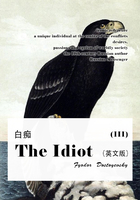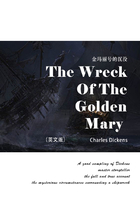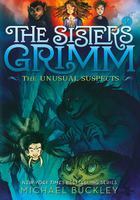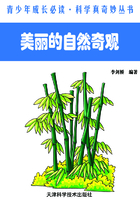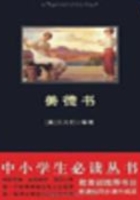It was not in the nature of things that a man of Mr Dombey's mood, opposed to such a spirit as he had raised against himself, should be softened in the imperious asperity of his temper; or that the cold hard armour of pride in which he lived encased, should be made more flexible by constant collision with haughty scorn and defiance. It is the curse of such a nature - it is a main part of the heavy retribution on itself it bears within itself - that while deference and concession swell its evil qualities, and are the food it grows upon, resistance and a questioning of its exacting claims, foster it too, no less. The evil that is in it finds equally its means of growth and propagation in opposites. It draws support and life from sweets and bitters; bowed down before, or unacknowledged, it still enslaves the breast in which it has its throne; and, worshipped or rejected, is as hard a master as the Devil in dark fables.
Towards his first wife, Mr Dombey, in his cold and lofty arrogance, had borne himself like the removed Being he almost conceived himself to be. He had been 'Mr Dombey' with her when she first saw him, and he was 'Mr Dombey' when she died. He had asserted his greatness during their whole married life, and she had meekly recognised it. He had kept his distant seat of state on the top of his throne, and she her humble station on its lowest step; and much good it had done him, so to live in solitary bondage to his one idea. He had imagined that the proud character of his second wife would have been added to his own - would have merged into it, and exalted his greatness. He had pictured himself haughtier than ever, with Edith's haughtiness subservient to his. He had never entertained the possibility of its arraying itself against him. And now, when he found it rising in his path at every step and turn of his daily life, fixing its cold, defiant, and contemptuous face upon him, this pride of his, instead of withering, or hanging down its head beneath the shock, put forth new shoots, became more concentrated and intense, more gloomy, sullen, irksome, and unyielding, than it had ever been before.
Who wears such armour, too, bears with him ever another heavy retribution. It is of proof against conciliation, love, and confidence; against all gentle sympathy from without, all trust, all tenderness, all soft emotion; but to deep stabs in the self-love, it is as vulnerable as the bare breast to steel; and such tormenting festers rankle there, as follow on no other wounds, no, though dealt with the mailed hand of Pride itself, on weaker pride, disarmed and thrown down.
Such wounds were his. He felt them sharply, in the solitude of his old rooms; whither he now began often to retire again, and pass long solitary hours. It seemed his fate to be ever proud and powerful; ever humbled and powerless where he would be most strong. Who seemed fated to work out that doom?
Who? Who was it who could win his wife as she had won his boy? Who was it who had shown him that new victory, as he sat in the dark corner? Who was it whose least word did what his utmost means could not? Who was it who, unaided by his love, regard or notice, thrived and grew beautiful when those so aided died? Who could it be, but the same child at whom he had often glanced uneasily in her motherless infancy, with a kind of dread, lest he might come to hate her; and of whom his foreboding was fulfilled, for he DID hate her in his heart?
Yes, and he would have it hatred, and he made it hatred, though some sparkles of the light in which she had appeared before him on the memorable night of his return home with his Bride, occasionally hung about her still. He knew now that she was beautiful; he did not dispute that she was graceful and winning, and that in the bright dawn of her womanhood she had come upon him, a surprise. But he turned even this against her. In his sullen and unwholesome brooding, the unhappy man, with a dull perception of his alienation from all hearts, and a vague yearning for what he had all his life repelled, made a distorted picture of his rights and wrongs, and justified himself with it against her. The worthier she promised to be of him, the greater claim he was disposed to antedate upon her duty and submission. When had she ever shown him duty and submission? Did she grace his life - or Edith's? Had her attractions been manifested first to him - or Edith? Why, he and she had never been, from her birth, like father and child! They had always been estranged. She had crossed him every way and everywhere. She was leagued against him now. Her very beauty softened natures that were obdurate to him, and insulted him with an unnatural triumph.
It may have been that in all this there were mutterings of an awakened feeling in his breast, however selfishly aroused by his position of disadvantage, in comparison with what she might have made his life. But he silenced the distant thunder with the rolling of his sea of pride. He would bear nothing but his pride. And in his pride, a heap of inconsistency, and misery, and self-inflicted torment, he hated her.
To the moody, stubborn, sullen demon, that possessed him, his wife opposed her different pride in its full force. They never could have led a happy life together; but nothing could have made it more unhappy, than the wilful and determined warfare of such elements. His pride was set upon maintaining his magnificent supremacy, and forcing recognition of it from her. She would have been racked to death, and turned but her haughty glance of calm inflexible disdain upon him, to the last. Such recognition from Edith! He little knew through what a storm and struggle she had been driven onward to the crowning honour of his hand. He little knew how much she thought she had conceded, when she suffered him to call her wife.
Mr Dombey was resolved to show her that he was supreme. There must be no will but his. Proud he desired that she should be, but she must be proud for, not against him. As he sat alone, hardening, he would often hear her go out and come home, treading the round of London life with no more heed of his liking or disliking, pleasure or displeasure, than if he had been her groom. Her cold supreme indifference - his own unquestioned attribute usurped - stung him more than any other kind of treatment could have done; and he determined to bend her to his magnificent and stately will.
He had been long communing with these thoughts, when one night he sought her in her own apartment, after he had heard her return home late. She was alone, in her brilliant dress, and had but that moment come from her mother's room. Her face was melancholy and pensive, when he came upon her; but it marked him at the door; for, glancing at the mirror before it, he saw immediately, as in a picture-frame, the knitted brow, and darkened beauty that he knew so well.
'Mrs Dombey,' he said, entering, 'I must beg leave to have a few words with you.'
'To-morrow,' she replied.
'There is no time like the present, Madam,' he returned. 'You mistake your position. I am used to choose my own times; not to have them chosen for me. I think you scarcely understand who and what I am, Mrs Dombey.
'I think,' she answered, 'that I understand you very well.'
She looked upon him as she said so, and folding her white arms, sparkling with gold and gems, upon her swelling breast, turned away her eyes.
If she had been less handsome, and less stately in her cold composure, she might not have had the power of impressing him with the sense of disadvantage that penetrated through his utmost pride. But she had the power, and he felt it keenly. He glanced round the room: saw how the splendid means of personal adornment, and the luxuries of dress, were scattered here and there, and disregarded; not in mere caprice and carelessness (or so he thought), but in a steadfast haughty disregard of costly things: and felt it more and more. Chaplets of flowers, plumes of feathers, jewels, laces, silks and satins; look where he would, he saw riches, despised, poured out, and. made of no account. The very diamonds - a marriage gift - that rose and fell impatiently upon her bosom, seemed to pant to break the chain that clasped them round her neck, and roll down on the floor where she might tread upon them.
He felt his disadvantage, and he showed it. Solemn and strange among this wealth of colour and voluptuous glitter, strange and constrained towards its haughty mistress, whose repellent beauty it repeated, and presented all around him, as in so many fragments of a mirror, he was conscious of embarrassment and awkwardness. Nothing that ministered to her disdainful self-possession could fail to gall him. Galled and irritated with himself, he sat down, and went on, in no improved humour:
'Mrs Dombey, it is very necessary that there should be some understanding arrived at between us. Your conduct does not please me, Madam.'
She merely glanced at him again, and again averted her eyes; but she might have spoken for an hour, and expressed less.
'I repeat, Mrs Dombey, does not please me. I have already taken occasion to request that it may be corrected. I now insist upon it.'
'You chose a fitting occasion for your first remonstrance, Sir, and you adopt a fitting manner, and a fitting word for your second. You insist! To me!'
'Madam,' said Mr Dombey, with his most offensive air of state, 'I have made you my wife. You bear my name. You are associated with my position and my reputation. I will not say that the world in general may be disposed to think you honoured by that association; but I will say that I am accustomed to "insist," to my connexions and dependents.'
'Which may you be pleased to consider me? she asked.
'Possibly I may think that my wife should partake - or does partake, and cannot help herself - of both characters, Mrs Dombey.'
She bent her eyes upon him steadily, and set her trembling lips. He saw her bosom throb, and saw her face flush and turn white. All this he could know, and did: but he could not know that one word was whispering in the deep recesses of her heart, to keep her quiet; and that the word was Florence.
Blind idiot, rushing to a precipice! He thought she stood in awe of him.
'You are too expensive, Madam,' said Mr Dombey. 'You are extravagant. You waste a great deal of money - or what would be a great deal in the pockets of most gentlemen - in cultivating a kind of society that is useless to me, and, indeed, that upon the whole is disagreeable to me. I have to insist upon a total change in all these respects. I know that in the novelty of possessing a tithe of such means as Fortune has placed at your disposal, ladies are apt to run into a sudden extreme. There has been more than enough of that extreme. I beg that Mrs Granger's very different experiences may now come to the instruction of Mrs Dombey.'
Still the fixed look, the trembling lips, the throbbing breast, the face now crimson and now white; and still the deep whisper Florence, Florence, speaking to her in the beating of her heart.
His insolence of self-importance dilated as he saw this alteration in her. Swollen no less by her past scorn of him, and his so recent feeling of disadvantage, than by her present submission (as he took it to be), it became too mighty for his breast, and burst all bounds. Why, who could long resist his lofty will and pleasure! He had resolved to conquer her, and look here!
'You will further please, Madam,' said Mr Dombey, in a tone of sovereign command, 'to understand distinctly, that I am to be deferred to and obeyed. That I must have a positive show and confession of deference before the world, Madam. I am used to this. I require it as my right. In short I will have it. I consider it no unreasonable return for the worldly advancement that has befallen you; and I believe nobody will be surprised, either at its being required from you, or at your making it. - To Me - To Me!' he added, with emphasis.
No word from her. No change in her. Her eyes upon him.
'I have learnt from your mother, Mrs Dombey,' said Mr Dombey, with magisterial importance, what no doubt you know, namely, that Brighton is recommended for her health. Mr Carker has been so good
She changed suddenly. Her face and bosom glowed as if the red light of an angry sunset had been flung upon them. Not unobservant of the change, and putting his own interpretation upon it, Mr Dombey resumed:
'Mr Carker has been so good as to go down and secure a house there, for a time. On the return of the establishment to London, I shall take such steps for its better management as I consider necessary. One of these, will be the engagement at Brighton (if it is to be effected), of a very respectable reduced person there, a Mrs Pipchin, formerly employed in a situation of trust in my family, to act as housekeeper. An establishment like this, presided over but nominally, Mrs Dombey, requires a competent head.'
She had changed her attitude before he arrived at these words, and now sat - still looking at him fixedly - turning a bracelet round and round upon her arm; not winding it about with a light, womanly touch, but pressing and dragging it over the smooth skin, until the white limb showed a bar of red.
'I observed,' said Mr Dombey - 'and this concludes what I deem it necessary to say to you at present, Mrs Dombey - I observed a moment ago, Madam, that my allusion to Mr Carker was received in a peculiar manner. On the occasion of my happening to point out to you, before that confidential agent, the objection I had to your mode of receiving my visitors, you were pleased to object to his presence. You will have to get the better of that objection, Madam, and to accustom yourself to it very probably on many similar occasions; unless you adopt the remedy which is in your own hands, of giving me no cause of complaint. Mr Carker,' said Mr Dombey, who, after the emotion he had just seen, set great store by this means of reducing his proud wife, and who was perhaps sufficiently willing to exhibit his power to that gentleman in a new and triumphant aspect, 'Mr Carker being in my confidence, Mrs Dombey, may very well be in yours to such an extent. I hope, Mrs Dombey,' he continued, after a few moments, during which, in his increasing haughtiness, he had improved on his idea, 'I may not find it necessary ever to entrust Mr Carker with any message of objection or remonstrance to you; but as it would be derogatory to my position and reputation to be frequently holding trivial disputes with a lady upon whom I have conferred the highest distinction that it is in my power to bestow, I shall not scruple to avail myself of his services if I see occasion.'
'And now,' he thought, rising in his moral magnificence, and rising a stiffer and more impenetrable man than ever, 'she knows me and my resolution.'
The hand that had so pressed the bracelet was laid heavily upon her breast, but she looked at him still, with an unaltered face, and said in a low voice:
'Wait! For God's sake! I must speak to you.'
Why did she not, and what was the inward struggle that rendered her incapable of doing so, for minutes, while, in the strong constraint she put upon her face, it was as fixed as any statue's - looking upon him with neither yielding nor unyielding, liking nor hatred, pride not humility: nothing but a searching gaze?
'Did I ever tempt you to seek my hand? Did I ever use any art to win you? Was I ever more conciliating to you when you pursued me, than I have been since our marriage? Was I ever other to you than I am?'
'It is wholly unnecessary, Madam,' said Mr Dombey, 'to enter upon such discussions.'
'Did you think I loved you? Did you know I did not? Did you ever care, Man! for my heart, or propose to yourself to win the worthless thing? Was there any poor pretence of any in our bargain? Upon your side, or on mine?'
'These questions,' said Mr Dombey, 'are all wide of the purpose, Madam.'
She moved between him and the door to prevent his going away, and drawing her majestic figure to its height, looked steadily upon him still.
'You answer each of them. You answer me before I speak, I see. How can you help it; you who know the miserable truth as well as I? Now, tell me. If I loved you to devotion, could I do more than render up my whole will and being to you, as you have just demanded? If my heart were pure and all untried, and you its idol, could you ask more; could you have more?'
'Possibly not, Madam,' he returned coolly.
'You know how different I am. You see me looking on you now, and you can read the warmth of passion for you that is breathing in my face.' Not a curl of the proud lip, not a flash of the dark eye, nothing but the same intent and searching look, accompanied these words. 'You know my general history. You have spoken of my mother. Do you think you can degrade, or bend or break, me to submission and obedience?'
Mr Dombey smiled, as he might have smiled at an inquiry whether he thought he could raise ten thousand pounds.
'If there is anything unusual here,' she said, with a slight motion of her hand before her brow, which did not for a moment flinch from its immovable and otherwise expressionless gaze, 'as I know there are unusual feelings here,' raising the hand she pressed upon her bosom, and heavily returning it, 'consider that there is no common meaning in the appeal I am going to make you. Yes, for I am going;' she said it as in prompt reply to something in his face; 'to appeal to you.'
Mr Dombey, with a slightly condescending bend of his chin that rustled and crackled his stiff cravat, sat down on a sofa that was near him, to hear the appeal.
'If you can believe that I am of such a nature now,' - he fancied he saw tears glistening in her eyes, and he thought, complacently, that he had forced them from her, though none fell on her cheek, and she regarded him as steadily as ever, - 'as would make what I now say almost incredible to myself, said to any man who had become my husband, but, above all, said to you, you may, perhaps, attach the greater weight to it. In the dark end to which we are tending, and may come, we shall not involve ourselves alone (that might not be much) but others.'
Others! He knew at whom that word pointed, and frowned heavily.
'I speak to you for the sake of others. Also your own sake; and for mine. Since our marriage, you have been arrogant to me; and I have repaid you in kind. You have shown to me and everyone around us, every day and hour, that you think I am graced and distinguished by your alliance. I do not think so, and have shown that too. It seems you do not understand, or (so far as your power can go) intend that each of us shall take a separate course; and you expect from me instead, a homage you will never have.'
Although her face was still the same, there was emphatic confirmation of this 'Never' in the very breath she drew.
'I feel no tenderness towards you; that you know. You would care nothing for it, if I did or could. I know as well that you feel none towards me. But we are linked together; and in the knot that ties us, as I have said, others are bound up. We must both die; we are both connected with the dead already, each by a little child. Let us forbear.'
Mr Dombey took a long respiration, as if he would have said, Oh! was this all!
'There is no wealth,' she went on, turning paler as she watched him, while her eyes grew yet more lustrous in their earnestness, 'that could buy these words of me, and the meaning that belongs to them. Once cast away as idle breath, no wealth or power can bring them back. I mean them; I have weighed them; and I will be true to what I undertake. If you will promise to forbear on your part, I will promise to forbear on mine. We are a most unhappy pair, in whom, from different causes, every sentiment that blesses marriage, or justifies it, is rooted out; but in the course of time, some friendship, or some fitness for each other, may arise between us. I will try to hope so, if you will make the endeavour too; and I will look forward to a better and a happier use of age than I have made of youth or prime.
Throughout she had spoken in a low plain voice, that neither rose nor fell; ceasing, she dropped the hand with which she had enforced herself to be so passionless and distinct, but not the eyes with which she had so steadily observed him.
'Madam,' said Mr Dombey, with his utmost dignity, 'I cannot entertain any proposal of this extraordinary nature.
She looked at him yet, without the least change.
'I cannot,' said Mr Dombey, rising as he spoke, 'consent to temporise or treat with you, Mrs Dombey, upon a subject as to which you are in possession of my opinions and expectations. I have stated my ultimatum, Madam, and have only to request your very serious attention to it.'
To see the face change to its old expression, deepened in intensity! To see the eyes droop as from some mean and odious object! To see the lighting of the haughty brow! To see scorn, anger, indignation, and abhorrence starting into sight, and the pale blank earnestness vanish like a mist! He could not choose but look, although he looked to his dismay.
'Go, Sir!' she said, pointing with an imperious hand towards the door. 'Our first and last confidence is at an end. Nothing can make us stranger to each other than we are henceforth.'
'I shall take my rightful course, Madam,' said Mr Dombey, 'undeterred, you may be sure, by any general declamation.'
She turned her back upon him, and, without reply, sat down before her glass.
'I place my reliance on your improved sense of duty, and more correct feeling, and better reflection, Madam,' said Mr Dombey.
She answered not one word. He saw no more expression of any heed of him, in the mirror, than if he had been an unseen spider on the wall, or beetle on the floor, or rather, than if he had been the one or other, seen and crushed when she last turned from him, and forgotten among the ignominious and dead vermin of the ground.
He looked back, as he went out at the door, upon the well-lighted and luxurious room, the beautiful and glittering objects everywhere displayed, the shape of Edith in its rich dress seated before her glass, and the face of Edith as the glass presented it to him; and betook himself to his old chamber of cogitation, carrying away with him a vivid picture in his mind of all these things, and a rambling and unaccountable speculation (such as sometimes comes into a man's head) how they would all look when he saw them next.
For the rest, Mr Dombey was very taciturn, and very dignified, and very confident of carrying out his purpose; and remained so.
He did not design accompanying the family to Brighton; but he graciously informed Cleopatra at breakfast, on the morning of departure, which arrived a day or two afterwards, that he might be expected down, soon. There was no time to be lost in getting Cleopatra to any place recommended as being salutary; for, indeed, she seemed upon the wane, and turning of the earth, earthy.
Without having undergone any decided second attack of her malady, the old woman seemed to have crawled backward in her recovery from the first. She was more lean and shrunken, more uncertain in her imbecility, and made stranger confusions in her mind and memory. Among other symptoms of this last affliction, she fell into the habit of confounding the names of her two sons-in-law, the living and the deceased; and in general called Mr Dombey, either 'Grangeby,' or 'Domber,' or indifferently, both.
But she was youthful, very youthful still; and in her youthfulness appeared at breakfast, before going away, in a new bonnet made express, and a travelling robe that was embroidered and braided like an old baby's. It was not easy to put her into a fly-away bonnet now, or to keep the bonnet in its place on the back of her poor nodding head, when it was got on. In this instance, it had not only the extraneous effect of being always on one side, but of being perpetually tapped on the crown by Flowers the maid, who attended in the background during breakfast to perform that duty.
'Now, my dearest Grangeby,' said Mrs Skewton, 'you must posively prom,' she cut some of her words short, and cut out others altogether, 'come down very soon.'
'I said just now, Madam,' returned Mr Dombey, loudly and laboriously, 'that I am coming in a day or two.'
'Bless you, Domber!'
Here the Major, who was come to take leave of the ladies, and who was staring through his apoplectic eyes at Mrs Skewton's face with the disinterested composure of an immortal being, said:
'Begad, Ma'am, you don't ask old Joe to come!'
'Sterious wretch, who's he?' lisped Cleopatra. But a tap on the bonnet from Flowers seeming to jog her memory, she added, 'Oh! You mean yourself, you naughty creature!'
'Devilish queer, Sir,' whispered the Major to Mr Dombey. 'Bad case. Never did wrap up enough;' the Major being buttoned to the chin. 'Why who should J. B. mean by Joe, but old Joe Bagstock - Joseph - your slave - Joe, Ma'am? Here! Here's the man! Here are the Bagstock bellows, Ma'am!' cried the Major, striking himself a sounding blow on the chest.
'My dearest Edith - Grangeby - it's most trordinry thing,' said Cleopatra, pettishly, 'that Major - '
'Bagstock! J. B.!' cried the Major, seeing that she faltered for his name.
'Well, it don't matter,' said Cleopatra. 'Edith, my love, you know I never could remember names - what was it? oh! - most trordinry thing that so many people want to come down to see me. I'm not going for long. I'm coming back. Surely they can wait, till I come back!'
Cleopatra looked all round the table as she said it, and appeared very uneasy.
'I won't have Vistors - really don't want visitors,' she said; 'little repose - and all that sort of thing - is what I quire. No odious brutes must proach me till I've shaken off this numbness;' and in a grisly resumption of her coquettish ways, she made a dab at the Major with her fan, but overset Mr Dombey's breakfast cup instead, which was in quite a different direction.
Then she called for Withers, and charged him to see particularly that word was left about some trivial alterations in her room, which must be all made before she came back, and which must be set about immediately, as there was no saying how soon she might come back; for she had a great many engagements, and all sorts of people to call upon. Withers received these directions with becoming deference, and gave his guarantee for their execution; but when he withdrew a pace or two behind her, it appeared as if he couldn't help looking strangely at the Major, who couldn't help looking strangely at Mr Dombey, who couldn't help looking strangely at Cleopatra, who couldn't help nodding her bonnet over one eye, and rattling her knife and fork upon her plate in using them, as if she were playing castanets.
Edith alone never lifted her eyes to any face at the table, and never seemed dismayed by anything her mother said or did. She listened to her disjointed talk, or at least, turned her head towards her when addressed; replied in a few low words when necessary; and sometimes stopped her when she was rambling, or brought her thoughts back with a monosyllable, to the point from which they had strayed. The mother, however unsteady in other things, was constant in this - that she was always observant of her. She would look at the beautiful face, in its marble stillness and severity, now with a kind of fearful admiration; now in a giggling foolish effort to move it to a smile; now with capricious tears and jealous shakings of her head, as imagining herself neglected by it; always with an attraction towards it, that never fluctuated like her other ideas, but had constant possession of her. From Edith she would sometimes look at Florence, and back again at Edith, in a manner that was wild enough; and sometimes she would try to look elsewhere, as if to escape from her daughter's face; but back to it she seemed forced to come, although it never sought hers unless sought, or troubled her with one single glance.
The best concluded, Mrs Skewton, affecting to lean girlishly upon the Major's arm, but heavily supported on the other side by Flowers the maid, and propped up behind by Withers the page, was conducted to the carriage, which was to take her, Florence, and Edith to Brighton.
'And is Joseph absolutely banished?' said the Major, thrusting in his purple face over the steps. 'Damme, Ma'am, is Cleopatra so hard-hearted as to forbid her faithful Antony Bagstock to approach the presence?'
'Go along!' said Cleopatra, 'I can't bear you. You shall see me when I come back, if you are very good.'
'Tell Joseph, he may live in hope, Ma'am,' said the Major; 'or he'll die in despair.'
Cleopatra shuddered, and leaned back. 'Edith, my dear,' she said. 'Tell him - '
'What?'
'Such dreadful words,' said Cleopatra. 'He uses such dreadful words!'
Edith signed to him to retire, gave the word to go on, and left the objectionable Major to Mr Dombey. To whom he returned, whistling.
'I'll tell you what, Sir,' said the Major, with his hands behind him, and his legs very wide asunder, 'a fair friend of ours has removed to Queer Street.'
'What do you mean, Major?' inquired Mr Dombey.
'I mean to say, Dombey,' returned the Major, 'that you'll soon be an orphan-in-law.'
Mr Dombey appeared to relish this waggish description of himself so very little, that the Major wound up with the horse's cough, as an expression of gravity.
'Damme, Sir,' said the Major, 'there is no use in disguising a fact. Joe is blunt, Sir. That's his nature. If you take old Josh at all, you take him as you find him; and a devilish rusty, old rasper, of a close-toothed, J. B. file, you do find him. Dombey,' said the Major, 'your wife's mother is on the move, Sir.'
'I fear,' returned Mr Dombey, with much philosophy, 'that Mrs Skewton is shaken.'
'Shaken, Dombey!' said the Major. 'Smashed!'
'Change, however,' pursued Mr Dombey, 'and attention, may do much yet.'
'Don't believe it, Sir,' returned the Major. 'Damme, Sir, she never wrapped up enough. If a man don't wrap up,' said the Major, taking in another button of his buff waistcoat, 'he has nothing to fall back upon. But some people will die. They will do it. Damme, they will. They're obstinate. I tell you what, Dombey, it may not be ornamental; it may not be refined; it may be rough and tough; but a little of the genuine old English Bagstock stamina, Sir, would do all the good in the world to the human breed.'
After imparting this precious piece of information, the Major, who was certainly true-blue, whatever other endowments he may have had or wanted, coming within the 'genuine old English' classification, which has never been exactly ascertained, took his lobster-eyes and his apoplexy to the club, and choked there all day.
Cleopatra, at one time fretful, at another self-complacent, sometimes awake, sometimes asleep, and at all times juvenile, reached Brighton the same night, fell to pieces as usual, and was put away in bed; where a gloomy fancy might have pictured a more potent skeleton than the maid, who should have been one, watching at the rose-coloured curtains, which were carried down to shed their bloom upon her.
It was settled in high council of medical authority that she should take a carriage airing every day, and that it was important she should get out every day, and walk if she could. Edith was ready to attend her - always ready to attend her, with the same mechanical attention and immovable beauty - and they drove out alone; for Edith had an uneasiness in the presence of Florence, now that her mother was worse, and told Florence, with a kiss, that she would rather they two went alone.
Mrs Skewton, on one particular day, was in the irresolute, exacting, jealous temper that had developed itself on her recovery from her first attack. After sitting silent in the carriage watching Edith for some time, she took her hand and kissed it passionately. The hand was neither given nor withdrawn, but simply yielded to her raising of it, and being released, dropped down again, almost as if it were insensible. At this she began to whimper and moan, and say what a mother she had been, and how she was forgotten! This she continued to do at capricious intervals, even when they had alighted: when she herself was halting along with the joint support of Withers and a stick, and Edith was walking by her side, and the carriage slowly following at a little distance.
It was a bleak, lowering, windy day, and they were out upon the Downs with nothing but a bare sweep of land between them and the sky. The mother, with a querulous satisfaction in the monotony of her complaint, was still repeating it in a low voice from time to time, and the proud form of her daughter moved beside her slowly, when there came advancing over a dark ridge before them, two other figures, which in the distance, were so like an exaggerated imitation of their own, that Edith stopped.
Almost as she stopped, the two figures stopped; and that one which to Edith's thinking was like a distorted shadow of her mother, spoke to the other, earnestly, and with a pointing hand towards them. That one seemed inclined to turn back, but the other, in which Edith recognised enough that was like herself to strike her with an unusual feeling, not quite free from fear, came on; and then they came on together.
The greater part of this observation, she made while walking towards them, for her stoppage had been momentary. Nearer observation showed her that they were poorly dressed, as wanderers about the country; that the younger woman carried knitted work or some such goods for sale; and that the old one toiled on empty-handed.
And yet, however far removed she was in dress, in dignity, in beauty, Edith could not but compare the younger woman with herself, still. It may have been that she saw upon her face some traces which she knew were lingering in her own soul, if not yet written on that index; but, as the woman came on, returning her gaze, fixing her shining eyes upon her, undoubtedly presenting something of her own air and stature, and appearing to reciprocate her own thoughts, she felt a chill creep over her, as if the day were darkening, and the wind were colder.
They had now come up. The old woman, holding out her hand importunately, stopped to beg of Mrs Skewton. The younger one stopped too, and she and Edith looked in one another's eyes.
'What is it that you have to sell?' said Edith.
'Only this,' returned the woman, holding out her wares, without looking at them. 'I sold myself long ago.'
'My Lady, don't believe her,' croaked the old woman to Mrs Skewton; 'don't believe what she says. She loves to talk like that. She's my handsome and undutiful daughter. She gives me nothing but reproaches, my Lady, for all I have done for her. Look at her now, my Lady, how she turns upon her poor old mother with her looks.'
As Mrs Skewton drew her purse out with a trembling hand, and eagerly fumbled for some money, which the other old woman greedily watched for - their heads all but touching, in their hurry and decrepitude - Edith interposed:
'I have seen you,' addressing the old woman, 'before.'
'Yes, my Lady,' with a curtsey. 'Down in Warwickshire. The morning among the trees. When you wouldn't give me nothing. But the gentleman, he give me something! Oh, bless him, bless him!' mumbled the old woman, holding up her skinny hand, and grinning frightfully at her daughter.
'It's of no use attempting to stay me, Edith!' said Mrs Skewton, angrily anticipating an objection from her. 'You know nothing about it. I won't be dissuaded. I am sure this is an excellent woman, and a good mother.'
'Yes, my Lady, yes,' chattered the old woman, holding out her avaricious hand. 'Thankee, my Lady. Lord bless you, my Lady. Sixpence more, my pretty Lady, as a good mother yourself.'
'And treated undutifully enough, too, my good old creature, sometimes, I assure you,' said Mrs Skewton, whimpering. 'There! Shake hands with me. You're a very good old creature - full of what's-his-name - and all that. You're all affection and et cetera, ain't you?'
'Oh, yes, my Lady!'
'Yes, I'm sure you are; and so's that gentlemanly creature Grangeby. I must really shake hands with you again. And now you can go, you know; and I hope,' addressing the daughter, 'that you'll show more gratitude, and natural what's-its-name, and all the rest of it - but I never remember names - for there never was a better mother than the good old creature's been to you. Come, Edith!'
As the ruin of Cleopatra tottered off whimpering, and wiping its eyes with a gingerly remembrance of rouge in their neighbourhood, the old woman hobbled another way, mumbling and counting her money. Not one word more, nor one other gesture, had been exchanged between Edith and the younger woman, but neither had removed her eyes from the other for a moment. They had remained confronted until now, when Edith, as awakening from a dream, passed slowly on.
'You're a handsome woman,' muttered her shadow, looking after her; 'but good looks won't save us. And you're a proud woman; but pride won't save us. We had need to know each other when we meet again!'


